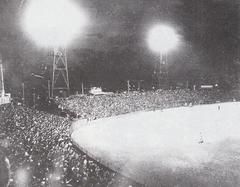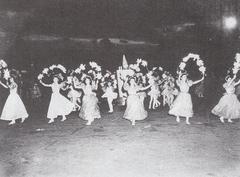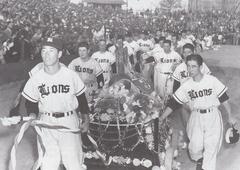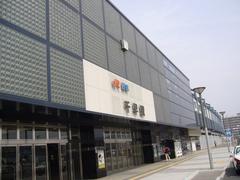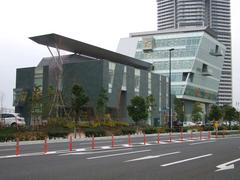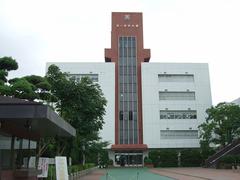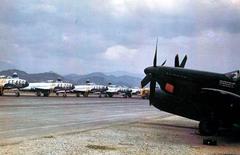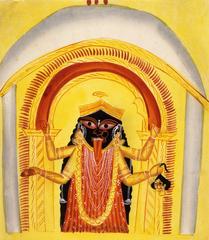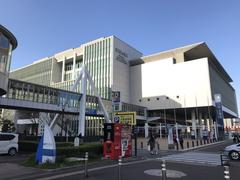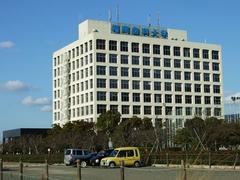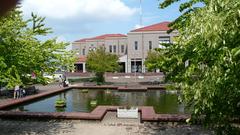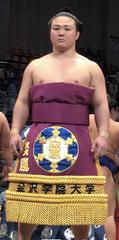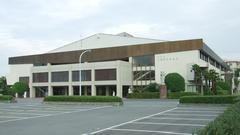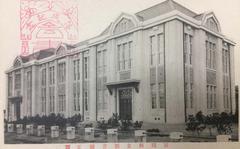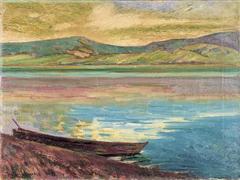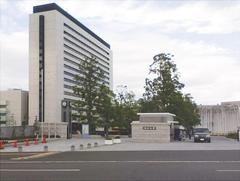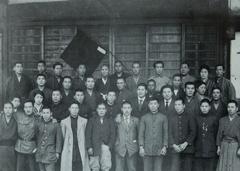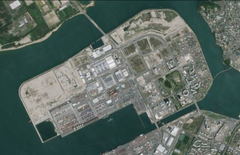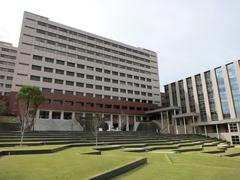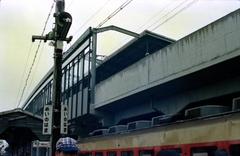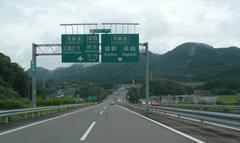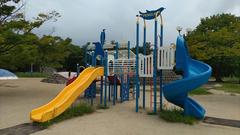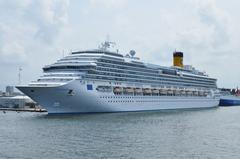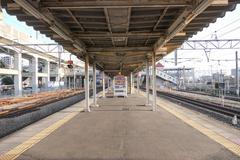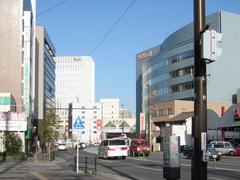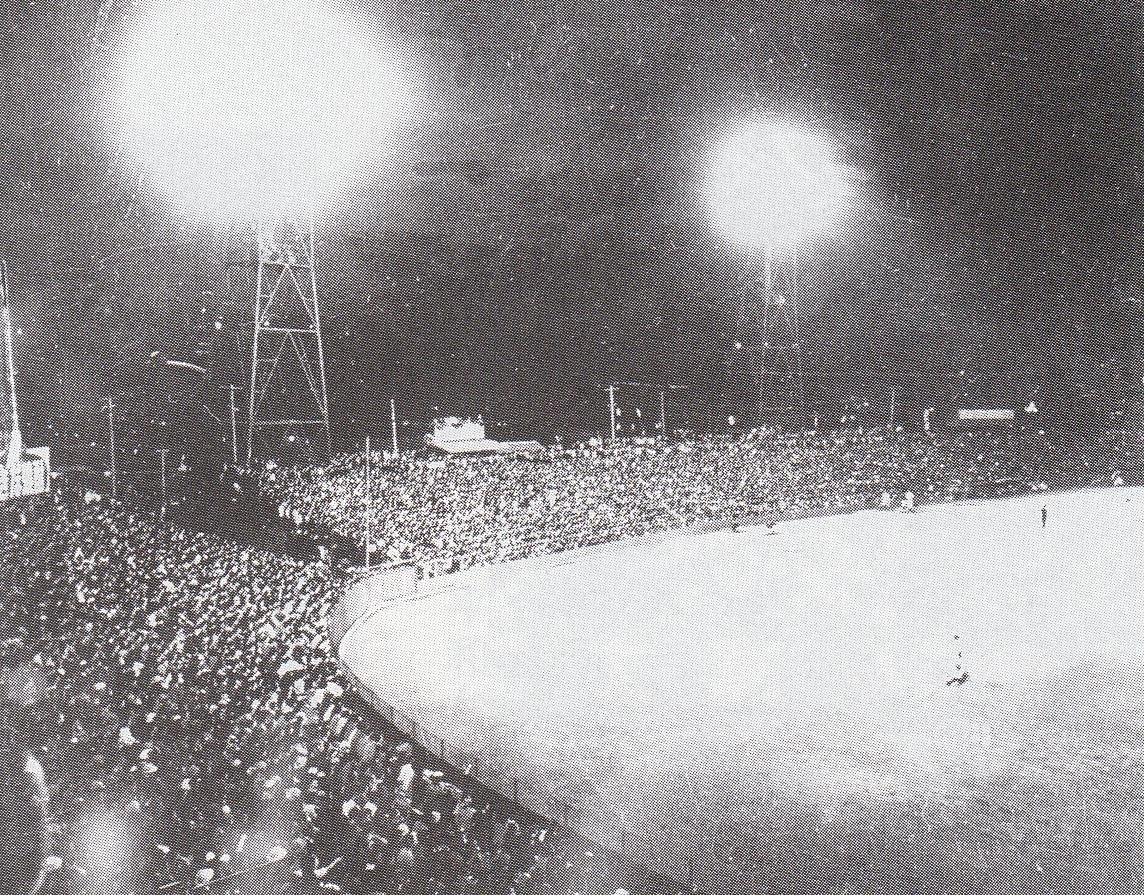
Heiwadai Stadium Visiting Hours, Tickets, and Historical Guide – Fukuoka, Japan
Date: 14/06/2025
Introduction
Heiwadai Stadium, once a vibrant centerpiece of Fukuoka’s sports and community life, is a landmark woven into the city’s postwar recovery, cultural evolution, and modern urban landscape. Built atop the historic grounds of Fukuoka Castle, the stadium stood as a symbol of peace and renewal for nearly five decades. Though demolished in 1997, its legacy endures through commemorative features and the Korokan archaeological site within Maizuru Park. Today, this area remains a significant Fukuoka historical site, offering free public access and a rich blend of sports heritage, ancient history, and tranquil parkland.
This comprehensive guide covers the stadium’s history, cultural significance, current site features, visiting hours, ticket information, travel tips, and nearby attractions. Whether you are a baseball enthusiast, history buff, or curious traveler, the Heiwadai Stadium site invites exploration and reflection on Fukuoka’s layered past (Wikiwand, Go Fukuoka, Everybody Hates A Tourist).
Table of Contents
- Origins and Historical Overview
- Role in Japanese Professional Baseball
- Stadium Renovations and Modernization
- Cultural and Community Significance
- Decline, Closure, and Site Transformation
- Visiting Heiwadai Stadium Today
- Travel Tips and Safety
- Frequently Asked Questions (FAQ)
- Conclusion and Visitor Recommendations
- References
Origins and Historical Overview
Heiwadai Stadium (平和台野球場, Heiwadai Yakyūjō) was constructed in the late 1940s on the site of the former Fukuoka Castle, which had served as a military base. The area was repurposed after World War II as a symbol of peace and community, giving rise to the name “Heiwadai” or “Peace Plateau.” Initially developed for the 3rd National Sports Festival, the stadium featured modest wooden benches, reflecting the resource constraints of the time (Wikiwand).
Role in Japanese Professional Baseball
From 1950, Heiwadai Stadium became the home field for the Nishitetsu Lions, a prominent Nippon Professional Baseball (NPB) Pacific League team. It also hosted the Nishi Nippon Pirates and later the Fukuoka Daiei Hawks. Over its lifetime, the stadium staged 1,904 official NPB games, playing a crucial role in popularizing baseball throughout Kyushu and western Japan (Wikiwand).
Stadium Renovations and Modernization
Riding the popularity of the Lions and the rising demand for modern facilities, Heiwadai Stadium underwent significant renovations in the 1950s and 1960s. The seating capacity was expanded to 34,000, concrete stands replaced wooden benches, and new scoreboards and indoor facilities were added. These improvements, funded by the team and donated to the city, solidified the stadium’s status as a premier sports venue (Wikiwand).
Cultural and Community Significance
Heiwadai Stadium served not only as a sports venue but also as a social and cultural hub. It hosted local festivals, concerts, and civic events, strengthening community bonds. Its location within Maizuru Park, alongside the Fukuoka Castle ruins, created a unique blend of modern sporting culture and historical heritage (Go Fukuoka).
Baseball games, particularly those featuring the Nankai Hawks (later Fukuoka Daiei Hawks and now Fukuoka SoftBank Hawks), became major citywide events. The stadium was also the site of the 1958 Asian Games and a football venue during the 1964 Summer Olympics, underscoring its international significance.
Decline, Closure, and Site Transformation
By the late 1970s, declining attendance, financial troubles, and the discovery of the ancient Korokan ruins beneath the outfield led to the stadium’s closure. The last professional game was played in 1992, and the structure was dismantled by 1997. Archaeological excavations revealed the Korokan, a guesthouse for foreign envoys from the Heian period, further enhancing the site’s historical value (Wikiwand).
Today, the site is integrated into Maizuru Park as “Korokan Square,” with preserved outfield walls, informational panels, and the Korokan Ruin Museum marking the stadium’s legacy.
Visiting Heiwadai Stadium Today
Visiting Hours and Ticket Information
-
Maizuru Park & Heiwadai Ruins:
Open daily, year-round from dawn until dusk (typically 6:00 AM–7:00 PM; extended hours during cherry blossom season).
Admission: Free. No tickets required. -
Korokan Ruin Museum:
Open Tuesday–Sunday, 9:30 AM–5:00 PM (last admission 4:30 PM). Closed Mondays and public holidays.
Admission: Free.
Access and Transportation
- By Subway:
- Ohorikoen Station (Kuko Line): 5-minute walk to Maizuru Park (Everybody Hates A Tourist)
- Akasaka Station (Kuko Line): Also nearby
- By Bus:
Multiple city buses stop near Maizuru and Ohori Parks. - By Foot:
20-minute walk from downtown Tenjin. - By Taxi:
Readily available from Hakata Station and other city locations.
Facilities and Accessibility
- Amenities:
Public restrooms, benches, vending machines, and shaded seating throughout the park. - Accessibility:
Main paths are paved and suitable for wheelchairs and strollers; some uneven ground near castle ruins. - Museum:
Wheelchair accessible with multilingual displays.
What to See and Do
- Heiwadai Stadium Commemorative Features:
Stadium outline, plaques, and preserved seating sections. - Korokan Ruin Museum:
View Heian-era archaeological findings and learn about Fukuoka’s early international exchanges. - Walking Trails:
Well-maintained walking paths with historical panels and scenic park views. - Seasonal Events:
Cherry blossom festivals (late March–early April), local food fairs, and cultural celebrations.
Nearby Attractions
- Fukuoka Castle Ruins:
Stone walls, panoramic views, and historical context within Maizuru Park. - Ohori Park:
Large pond, Japanese garden, walking trails, and boat rentals. - Gokoku Shrine:
Shinto shrine dedicated to war dead. - Fukuoka Art Museum:
Japanese and international art collections.
Guided Tours and Events
- Guided Tours:
Occasional guided walking tours (in English and Japanese) are available through local tourist organizations. Check with Fukuoka City Tourist Information for schedules. - Special Events:
The Korokan Ruin Museum hosts talks and commemorative events, especially on stadium anniversaries.
Photography Tips
- Best Photo Spots:
Korokan archaeological site, preserved stadium walls, Fukuoka Castle ruins, and cherry blossoms in spring. - Guidelines:
Photography is generally allowed, but follow any posted restrictions.
Travel Tips and Safety
- Best Seasons:
Spring (cherry blossom season) and autumn offer pleasant weather and beautiful scenery. - Rainy Season (June):
Bring an umbrella and waterproof shoes; park paths can be slippery (Weather25). - Food:
Enjoy local specialties like Hakata ramen nearby or bring a picnic for the park. - Cultural Etiquette:
Respect the historical significance, avoid littering, and keep noise levels low in tranquil areas.
Frequently Asked Questions (FAQ)
Q: Is the Heiwadai Stadium still standing?
A: No, the stadium was demolished in 1997. The site is marked with commemorative features within Maizuru Park.
Q: What are the hours for visiting the stadium site and museum?
A: The park is open dawn to dusk; the Korokan Ruin Museum is open 9:30 AM–5:00 PM (closed Mondays).
Q: Is there an entrance fee?
A: No, both the park and museum are free to enter.
Q: Are guided tours available?
A: Yes, guided tours are occasionally offered—check with local tourism offices for current schedules.
Q: How do I get there by public transport?
A: The site is accessible via Ohorikoen or Akasaka subway stations on the Kuko Line, as well as by bus.
Conclusion and Visitor Recommendations
The Heiwadai Stadium site remains a powerful testament to Fukuoka’s historical journey—from ancient diplomacy to the golden age of Japanese baseball. As a free, accessible, and well-preserved destination, it appeals to sports fans, history enthusiasts, and anyone seeking tranquility amid the city’s vibrant culture. Enhance your visit by exploring nearby attractions such as Fukuoka Castle ruins and Ohori Park, and check local event calendars for seasonal festivals.
For the latest updates on opening hours, special events, and guided tours, download the Audiala app and follow Fukuoka’s official tourism channels. Immerse yourself in the dynamic heritage of the Heiwadai site and its surroundings, and experience the enduring spirit of Fukuoka.
References and Further Reading
- Heiwadai Stadium: A Historical Icon and Must-Visit Fukuoka Historical Site, Wikiwand
- Heiwadai Stadium History and Cultural Significance: Go Fukuoka
- Visiting Heiwadai Stadium Site: Everybody Hates A Tourist
- Weather25 – Fukuoka June Weather
- EaseWeather – Fukuoka June
- Japan Guide – Fukuoka
- Zimmin Around the World – Fukuoka Guide
- Living Nomads – Fukuoka Travel Guide
- City Unscripted – Fukuoka Travel Tips
